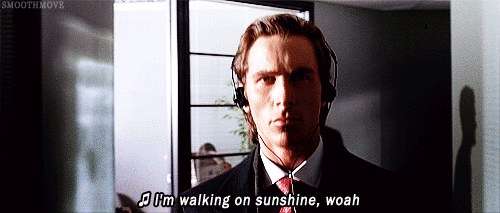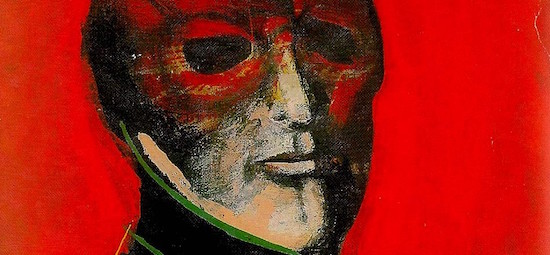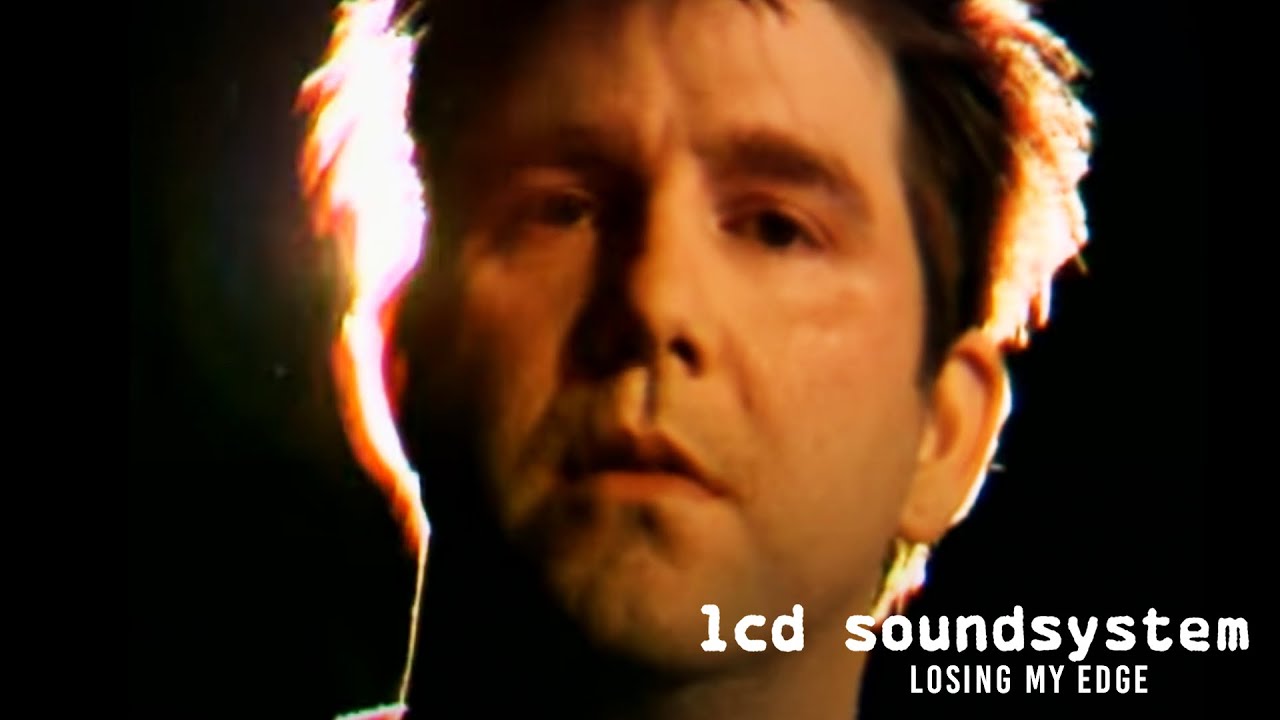
Image via Tumblr
Here’s a sentence no-one could have imagined reading back in 1991: American Psycho: The Musical is about to open on Broadway. Back then, the moral panic preceding the novel’s publication and the demented critical response that followed were still ringing in people’s ears. And yet it didn’t matter: readers got it, in great numbers, just like viewers would get Mary Harron’s film adaptation and London theatregoers the musical in its first, Matt Smith-starring run. Wall Street serial killer Patrick Bateman has become something like our Dorian Gray, an archetypal man of his age. His name is still used as a shorthand for yuppie wankers or the everyday brainwrongs wrought by aspirational lifestyles. Meanwhile, various reputations have built up on the novel like plaque. It’s the most disgusting, hilarious or boring book you’ll ever read. It’s a satire on 80s greed, a horror novel or a heady existential exercise. Chances are, it’s not quite how you remember it. It could crack you up in more ways than one.
And musical theatre is where we come in, as a bus-side poster advertising Les Misérables obscures the real-life homeless people 26-year-olds Timothy Price and Patrick Bateman are counting for fun on a cab ride. Price, the alphamost male in their crew, uses a newspaper as a prop to rant about the world going to hell in a handcart. His Gotham is filled with senseless murder, homeless black people, deluded liberal politicians, AIDS. Rich as Croesus and thick as mince, he thinks dyslexia could be a virus. But just as you’re settling in for a younger Bonfire Of The Vanities, they disembark and mistake a stranger for a friend. Bateman’s Terminator-like eye starts itemising his clothes with giddying accuracy. This inventory of overpriced, bland crap continues internally through their evening: he knows every label, shop and price tag, the name of each fabric, each muted shade of grey or beige. Finally, we retreat to Patrick’s Batecave where he jerks off thinking about a Calvin Klein model. And in the morning we’re treated to a terrifyingly comprehensive panorama of the products surrounding him. Welcome to hell.
Spending 400 pages in the company of horrible, boring bastards who don’t do much, except for the one who recites litanies of luxury products and tortures people, might not seem an enticing prospect. But American Psycho is so carefully weighed, crisply rendered and – thank god – piss-your-pants funny that once you’ve entered you can’t escape.
It does a lot more than skewer yuppies, though it does that mercilessly – particularly through music. The fascistic, racist, homophobic misogynists in Bateman’s crew describe expensive hi-fi systems as “hip” and play Phil Collins’ cover of ‘Groovy Kind Of Love’ on them. Our man’s comprehensive appraisals of Genesis and Whitney Houston are rightly renowned (that they follow scenes of stomach-churning violence cranks the hysteria up further). But there’s plenty more where they came from, like the chapter called ‘Concert’. The gang has VIP tickets for a U2 gig. Bateman’s intended date can’t make it because she’s at the launch of the British musical Maggie! The guys don’t seem keen on U2 until they’re assured that Donald Trump is a fan. Then Bateman has a transcendent experience: the room recedes and it’s just him and Bono, intimately connected. "And then everyone, the audience, the band, reappears and the music slowly swells up and Bono turns away and I’m left tingling, my face flushed, an aching erection pulsing against my thigh, my hands clenched in fists of tension."
Patrick takes the texts and films spewed out by his culture at face value. Fashion spreads, restaurant reviews, mega-selling music, sentimental political rhetoric, pornography, action films, adverts for beauty products, serial killer books, hi-fi magazines – they’re not diversions to him, they’re instruction manuals for how to become a real person. And the gulf between having the required accoutrements and really living drives him round the bend. When he asks an associate about his holiday what he hears in response is a talking travel brochure. On the odd occasion when the outside world intrudes on their circle, he malfunctions completely. Like when his closeted gay nemesis Luis Carruthers reports back on a recent business trip to Arizona:
"The client had the boudin blanc, the roasted chicken and the cheesecake," he says.
"Cheesecake?" I say, confused by this plain, alien-sounding list.
"What sauce or fruits were on the roasted chicken? What shapes was it cut into?"
"None, Patrick," he says, also confused. "It was… roasted."
"And the cheesecake, what flavor? Was it heated?" I say. "Ricotta cheesecake? Goat cheese? Were there flowers or cilantro in it?"
"It was just… regular," he says, and then, "Patrick, you’re sweating."
"What did she have?" I ask, ignoring him. "The client’s bimbo."
"Well, she had the country salad, the scallops and the lemon tart," Luis says.
"The scallops were grilled? Were they sashimi scallops? In a ceviche of sorts?" I’m asking. "Or were they gratinized?"
"No, Patrick," Luis says. "They were… broiled."
It’s silent in the boardroom as I contemplate this, thinking it through before asking, finally, "What’s ‘broiled,’ Luis?"
"I’m not sure," he says. "I think it involves… a pan."
"Wine?" I ask.
"An ’85 Sauvignon blanc," he says. "Jordan. Two bottles."
"Car?" I ask. "Did you rent while in Phoenix?"
"BMW." He smiles. "Little black beamer."
"Hip," I murmur, remembering last night, how I lost it completely in a stall at Nell’s – my mouth foaming, all I could think about were insects, lots of insects, and running at pigeons, foaming at the mouth and running at pigeons.
We’re a world away from the wry, toothless, plot-driven 80s satires of Tom Wolfe or Martin Amis here. In American Psycho we’re shown a tiny social circle in its antiseptic habitat. Not much of note happens outside of Bateman’s uncorroborated excesses. But refracted through his inner world, and thanks to Ellis’ gift for, well, writing, the tour we take is tense, energetic and – surprisingly, given what we’re shown – emotionally resonant. No one needs a cautionary tale about yuppies or serial killers being bad, but the silt these creeps stir up surrounds us all. Everyone has to filter friends from foes somehow. Everyone’s sense of identity is partly shaped by mediated material. While you have American Psycho on the go, you may get a heightened awareness of how all this plays out in your life – and your laughter won’t be comfortable. As hilarious as the characters’ status anxiety is (that showdown with the business cards!) there’s never been a tribe that’s immune to it.
And although Bateman’s crew could make you want to move to the woods, American Psycho is a great city novel. In passing, it captures the experience of bar-hopping and clubbing – the shouting and mishearing, the noise and daft conversation, the chance encounters – exquisitely. It’s just that their chance encounters go like this:
Two black guys are sitting with them at the table. Both sport faded jeans, T-shirts, and leather jackets. One has reflector sunglasses on, the other has a shaved head. Both are glaring at me. I stick out my hand at a crooked angle, trying to mimic a rapper. "Hey," I say. "I’m fresh. The freshest, y’know… like, uh, def… the deffest." I take a sip of champagne. "You know… def."
Bateman’s slippery sense of self is faithful to the reality of any young person establishing themselves in a major metropolis. Fantasy holds him together for now, but fantasy always turns sour if you stick around. Someone this image-conscious needs admirers to recognise his work (we’re told this or that woman he barely knows “is in love with me”). Unfortunately for him, his chief admirer is the increasingly flamboyant and pleading Carruthers, who keeps sidling up to him in clothes shops – even after Bateman pulls a knife and hisses after backing out of Paul Smith. A mate’s bar rant about the Japanese buying up New York inspires him to kill a North Asian food delivery man on the way to a Christmas party (and then realise he’s “the wrong kind of Asian” while he’s dumping the Chinese food on his dead face). Tidy work. Later in the novel, after excessive indulgence in various vices, we see grandiose paranoia take over: shoot-outs, car chases, SWAT team, the works, culminating in a tearful phone confession. But despite his showing the imaginative capabilities of a 10-year-old reared on action films, this is no straight parody. The distress is real enough to shake you up.
His victims are as capriciously compiled as the “In and Out” lists style magazines used to run. The full tally looks something like this: four black men (working class or homeless); a gay man and his dog; a Chinese man; Bateman’s colleague Paul Owen, who mistook him for another colleague; four women (two of them prostitutes); a child at Central Park zoo. Many more women are referred to in passing. Basically, if you’re not Patrick Bateman there’s a good chance he’d like to torture and kill you. And if you’re a woman it’ll be much worse. The notorious sex-murder scenes are still as horrible as their reputation suggests: impossibly far-fetched and obviously shaped by pornography and video nasties, but crikey. What is this extreme material for? It works as a counterweight for the starkly lit cultural anaemia. It’s the closest thing to a creative act someone truly trapped in that culture could come up with. It’s the logical, literal-minded conclusion to his associates’ shit banter about there being no women with “good personalities”.
But we never get an outside view. Are we looking at a psychopath in action, or experiencing someone’s psychosis? The problem with serial killers is, you never know what they’re thinking. They’d make terrible narrators, because they don’t have proper emotional lives – just an instinct for self-preservation. Bateman, on the other hand, must be the least manipulative, least calculating, least ambitious man on Wall Street. He’s constantly having anxiety attacks and popping tranquilisers. He flees social evenings and pleasant dates to return video tapes or watch TV. His lurid tales of cruelty, when you force yourself to stand back, look as realistic as severe anxiety sufferers’ fears that they’re about to turn into Jimmy Savile. Toward the end of the novel he’s depressed beyond tablets and keeps slipping into bizarre visions of global suffering:
The smell of blood works its way into my dreams, which are, for the most part, terrible: on an ocean liner that catches fire, witnessing volcanic eruptions in Hawaii, the violent deaths of most of the inside traders at Salomon, James Robinson doing something bad to me, finding myself back at boarding school, then at Harvard, the dead walk among the living. The dreams are an endless reel of car wrecks and disaster footage, electric chairs and grisly suicides, syringes and mutilated pinup girls, flying saucers, marble Jacuzzis, pink peppercorns.
And in the chapter ‘Tries to Cook and Eat Girl’, in which he does just that, Bateman seems an awful lot like a depressed person trying to force themselves to cook a proper meal for the first time in a while. Whatever your neuroses, you’ll likely recognise them in Bateman and feel closer to him. Disturbing.
But if Ellis had allowed us the breathing space to write all this off as a madman’s dream, American Psycho would fall apart. There are enough stray signals to scramble any picture you form. Patrick Bateman is equal parts man and myth, like a supervillain. A furball of fantasies and fears coughed up by his culture. A shuffled deck of traits held together by a Valentino suit. That’s what gives the novel such a strange emotional landscape. And even as the atmosphere progresses from dread through delirium to lassitude, somehow the comedy and drama keep jumping out at you.
Then
American Psycho led various parties in and around literary circles to ride their hobby horses off the edge of a cliff. The old guard of American letters sniffily assessed Ellis’ culpability and found him wanting. Political campaigners, proving that while art can deal with politics the reverse is never true, reacted to leaked excerpts of the nastiest scenes by making death threats via Ellis’ agent. The stout realists who ruled the creative writing industry thought Ellis had tried and failed to meet their requirements for what fiction should be, when really he just wasn’t into them. No-one considered American Psycho‘s relationship to gothic fiction, modernist city novels, the experiments of the Nouveau Roman, to Maldoror or À Rebours. It had stupid people in it, so it must be stupid.
And irresponsible. The condemnation was all about taste but was presented in moral terms. This book, the quaint argument went, was an instruction manual for recreational murder. People like you, with your idiotic pop music and horror films, would aspire to emulate these dull-suited bores and go forth to commit atrocities. What you needed was a poignant short story about someone remembering things on a farm, not this slick filth. Which was also boring, but dangerous, and exciting. Although wanting to retreat into a world where no-one listens to Phil Collins is understandable, the kitsch brand of present-proof authenticity these cats preferred wasn’t so different in spirit to Bruce Willis’s soul covers on The Return Of Bruno (1987) – Patrick Bateman’s favourite.
Now
…buy a product online without wading through insanely detailed reviews written by possible psychopaths. Martin Shkreli is now the deffest. This food diary reads like American Psycho with the murders edited out. Both Reagans died – no-one can remember when – but Donald Trump is running for President. Flats that look like stacks of Poundland tumblers spread across our cities. They are built to attract international Batemen and advertised using apocalyptic visions of shopping centres, military marches and flawless-looking people who are definitely on drugs. Online comment has corrected the slur that Phil Collins is bad. He’s not bad; he drummed for Brian Eno. The archetype for recreational murder is no longer the secret serial killer, but the public mass shooter with a manifesto. He was incubated in a safe space that mimicked those on the left of identity politics. Even British people get twitchy if a menu entry is less than three lines long. In a hypothetical present where men’s rights activists read novels, half of them would denounce American Psycho as a misandrist tract while the other half would claim it was about ethics in games journalism. Hereditary wealth is nearly essential if you want to get rich. In 1991 this was not yet the case. Everyone presents and responds to multiple, unblemished identities online. In a hypothetical present where PC Twitter read novels, it would be fine with the sex-murders in American Psycho as long as it could assign an initialism that granted people who fantasise about such things minority status. But it would still think Bret Easton Ellis deserves death for saying Kathryn Bigelow shouldn’t have won that Oscar. An anniversary piece in The Quietus said that American Psycho was a good book, not a bad one, for reasons you can’t recall. The blandness that yuppies’ money trapped them in has been overtaken by newer kinds: equally, pointlessly, hyperspecific. Christian Bale is best known as Batman and Bateman. There’s, like, pornography and violent stuff all over the internet if you want to look at it. There are no rough areas left in international cities. Today Patrick Bateman would be paralysed by the sheer scale of conflicting yet weightless opinion that passes across our…



